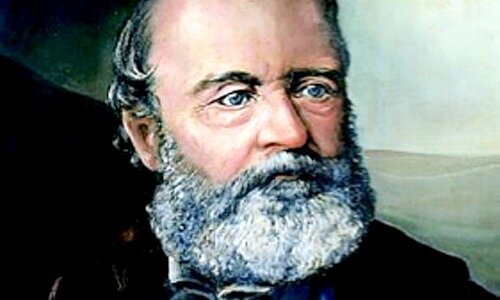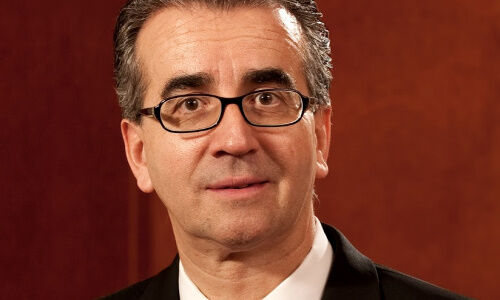The Black Lives Matter movement raises uncomfortable questions for Swiss banks, including Credit Suisse's legendary founder, Alfred Escher. finews.com asks Escher's biographer Joseph Jung if a historical reckoning looms.
Joseph Jung, you're the preeminent expert on Alfred Escher. Were you aware that Escher's family held slaves on their Cuban coffee bean plantations?
Of course. Except, there is no «Escher family» as such. The Eschers, one of Zurich's most notable families, is made up of many different branches. The question of slaveholdings in Cuba first surfaced in the 19th century. The topic was debated heatedly, politicized, and even became a matter for the courts.
Did you address the issue of slaveholdings in your various works on Escher?
Yes, starting with the first edition of my Escher biographies in 2006, and repeatedly until today. What I didn't originally know were the circumstances and background of the slaves on the coffee plantations, nor the fate of the individuals held as slaves.
«Escher's father fought accusations that his money was rooted in slavery in the courts»
I didn't have access to the Cuban primary sources, which have now been evaluated and published by historians. I addressed their findings in my most recent book in Switzerland's history.
Is the legacy of Alfred Escher, the father of Credit Suisse, connected to the slave trade?
I can unequivocally say that Alfred Escher was never in Cuba and didn't own any slaves. The debate centered around one of his uncles. Alfred Escher's father went to court to fight an accusation that his money was built through the slave trade. A Zurich court ruled in 1846 that Escher's father neither held slaves nor was involved in the sale trade.

(Alfred Escher, 1819-1882)
Does Alfred Escher's biography demand a rewrite – just as the term «blackamoor» is now considered racist?
History is permanently being rewritten. Historians are constantly researching and highlighting new contexts, and asking different questions. In the case of Alfred Escher, I assume that all the relevant primary sources have come to light.
«Monuments shouldn't simply commemorate the past»
There aren't any Swiss political or business leaders of the 19th century whose life and work have been subject to as much detailed analysis as Escher's.
What about statues and monuments in this context – does it make sense to question their value due to widespread anti-racism protests?
Firstly, there are various kinds of monuments. Some commemorate multifaceted events or people, while with others we may not even genuinely know anymore why someone wanted to commemorate something.
Sometimes monuments of great artistic value are displayed beside second- and third-rate ones. Then there are artistic renditions, monumental buildings, or even industrial heritage preservation. The Gotthard tunnel, for example, is a historical monument. Monuments shouldn't simply reflect history.
«The debate over new placards is misguided»
A monument should be thought-provoking – and yes, they should be called into question. We should critically evaluate events or people portrayed in monuments. In this context, a 19th-century monument still has meaning and warrants its spot.
Demands for Escher monuments range from adding a placard with historical context to removing statues of his likeness. What's the right thing to do?
Every owner of a piece of art is free to put up placards with more information. With Escher however the debate over placards is misguided: Escher's father bought and developed his Zurich properties long before the troubling Cuban slavery legacy: Hirschengraben buildings, Belvoir, and house along Zeltweg.
«How did slavery foster Swiss industrialization?»
And often historical context is too complicated to be summarized in a bullet point. Alfred Escher isn't the person who should be held responsible for the economics around slavery. How much did the slave trade and slave labor contribute to the industrialization of Switzerland? How much did Swiss trading benefit from slavery? These and other questions strike me as more suitable questions than demanding placards.
What does Alfred Escher warrant a monument for?
Alfred Escher fostered the development of Switzerland after 1848 like no other politician or business leader.
What can Alfred Escher teach us today?
So much! What infrastructure does a country need? What does education mean for society's development? Research? Can a small country be independent? Neutrality and foreign policy and the relationship to our neighbors as well as the wider world: contemporary questions are ultimately rooted in Alfred Escher's works.
Joseph Jung founded and led the Alfred Escher Foundation and was Credit Suisse's chief historian until 2014. He is the author of several books on Switzerland's industrial history, as well as a bestselling biography on Alfred Escher: The 19th-century politician was the linchpin between politics, railways, finance, and education during a key period of Switzerland's development. Escher, who lived from 1819 to 1882, established Credit Suisse in 1856 as well as insurer Swiss Life – not to mention leading technical university ETH in Zurich – in order to carry out ambitious infrastructure projects such as the 1880 transalpine Gotthard tunnel breakthrough. Jung, who has devoted much of his career to researching Escher, is now an independent historian and writer.




































